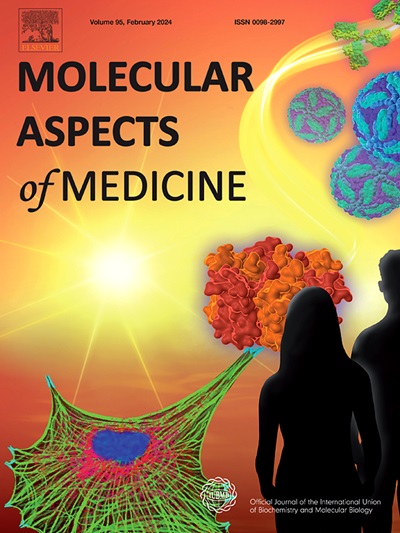Mitophagy: A key regulator of radiotherapy resistance in the tumor immune microenvironment
IF 10.3
2区 医学
Q1 BIOCHEMISTRY & MOLECULAR BIOLOGY
引用次数: 0
Abstract
Cancer remains a leading global cause of mortality, with radiation therapy (RT) as a cornerstone of treatment despite frequent radioresistance. Emerging evidence indicates that mitophagy activation contributes to adaptive radioresistance of cancer cells within the tumor microenvironment (TME). In this review, we highlight the dual role of mitophagy in modulating RT resistance and shaping the immune landscape of the TME. Mitophagy enhances cancer cell resilience by clearing radiation-damaged mitochondria, preserving metabolic homeostasis and reducing oxidative stress, while simultaneously altering the balance between immune activation and suppression within the TME. To provide mechanistic insight, we summarize key mitophagy-regulating pathways—including the PINK1/Parkin axis, BNIP3/NIX, and FUNDC1-mediated mechanisms—that respond to RT-induced mitochondrial stress and represent potential therapeutic targets. Furthermore, we explore how the interplay between mitophagy, metabolic reprogramming, and immune modulation shapes resistance not only to RT but also to immunotherapies such as immune checkpoint inhibitors (ICIs) and chimeric antigen receptor T (CAR-T) cell therapy. Additionally, we examine how Type 2 diabetes(T2DM) mellitus impacts this process, as its associated metabolic disturbances exacerbate mitochondrial vulnerability to radiation and create an immunosuppressive milieu that compromises the tumor immune landscape. Understanding these interactions may support development of personalized therapeutic strategies for diabetic cancer patients.
线粒体自噬:肿瘤免疫微环境中放疗抵抗的关键调节因子
癌症仍然是全球死亡的主要原因,尽管经常出现放射耐药,但放射治疗(RT)仍是治疗的基石。新出现的证据表明,线粒体自噬激活有助于肿瘤微环境(TME)内癌细胞的适应性辐射抵抗。在这篇综述中,我们强调了线粒体自噬在调节RT抵抗和塑造TME免疫景观中的双重作用。线粒体自噬通过清除辐射损伤的线粒体,保持代谢稳态和减少氧化应激,同时改变TME内免疫激活和抑制之间的平衡,增强癌细胞的恢复能力。为了提供机制方面的见解,我们总结了关键的线粒体自噬调节途径,包括PINK1/Parkin轴、BNIP3/NIX和fundc1介导的机制,这些机制对rt诱导的线粒体应激做出反应,并代表了潜在的治疗靶点。此外,我们探讨了线粒体自噬、代谢重编程和免疫调节之间的相互作用如何不仅对RT产生耐药性,而且对免疫疗法(如免疫检查点抑制剂(ICIs)和嵌合抗原受体T (CAR-T)细胞疗法)产生耐药性。此外,我们研究了2型糖尿病(T2DM)是如何影响这一过程的,因为其相关的代谢紊乱加剧了线粒体对辐射的易感性,并创造了一个损害肿瘤免疫景观的免疫抑制环境。了解这些相互作用可能有助于开发针对糖尿病癌症患者的个性化治疗策略。
本文章由计算机程序翻译,如有差异,请以英文原文为准。
求助全文
约1分钟内获得全文
求助全文
来源期刊

Molecular Aspects of Medicine
医学-生化与分子生物学
CiteScore
18.20
自引率
0.00%
发文量
85
审稿时长
55 days
期刊介绍:
Molecular Aspects of Medicine is a review journal that serves as an official publication of the International Union of Biochemistry and Molecular Biology. It caters to physicians and biomedical scientists and aims to bridge the gap between these two fields. The journal encourages practicing clinical scientists to contribute by providing extended reviews on the molecular aspects of a specific medical field. These articles are written in a way that appeals to both doctors who may struggle with basic science and basic scientists who may have limited awareness of clinical practice issues. The journal covers a wide range of medical topics to showcase the molecular insights gained from basic science and highlight the challenging problems that medicine presents to the scientific community.
 求助内容:
求助内容: 应助结果提醒方式:
应助结果提醒方式:


